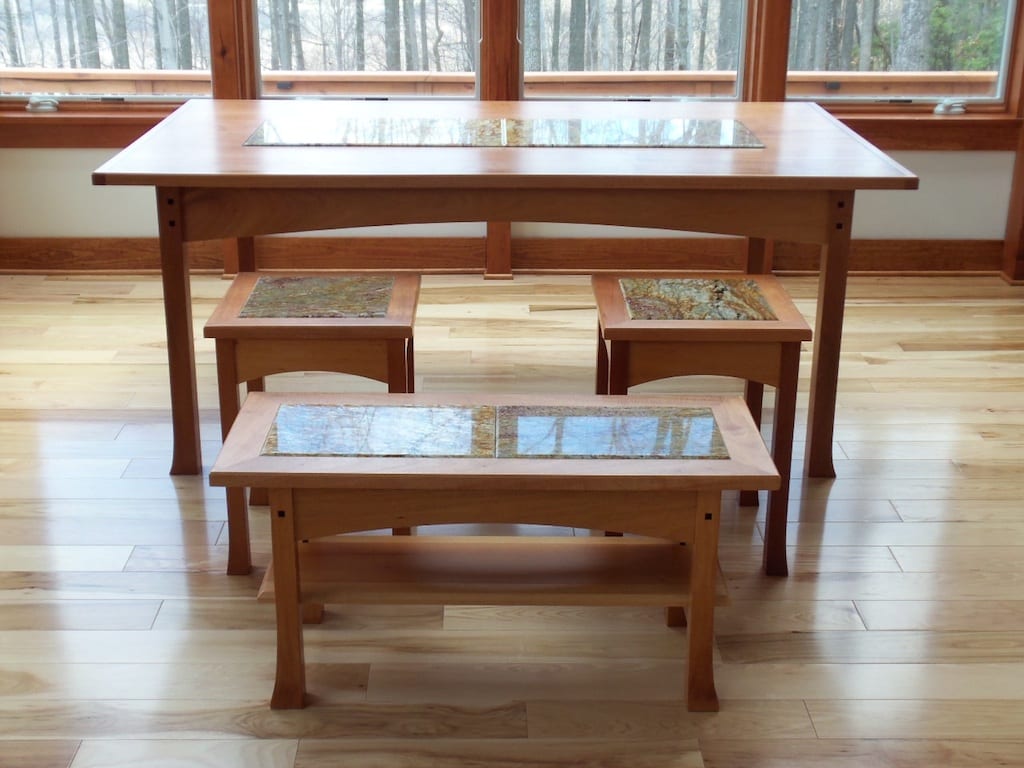 A few days ago, my husband and I visited Fred Dodson, a furniture and cabinet-maker in Charlottesville, to discuss chairs for the dining, coffee and end tables that he made for our mountain house. Walking through the back door of his workshop, we sang our greetings then settled in the front office area to look at possible design models on Fred’s computer. Keith sat in a chair adjacent to the screen, and Fred perched on a coffee table across from Keith. I sat in a chair that could easily have been scooted forward, but chose an observation post several feet away then crossed my arms over my chest. Almost immediately, I remembered my New Year’s resolution and asked myself: “What about this situation is difficult?”
A few days ago, my husband and I visited Fred Dodson, a furniture and cabinet-maker in Charlottesville, to discuss chairs for the dining, coffee and end tables that he made for our mountain house. Walking through the back door of his workshop, we sang our greetings then settled in the front office area to look at possible design models on Fred’s computer. Keith sat in a chair adjacent to the screen, and Fred perched on a coffee table across from Keith. I sat in a chair that could easily have been scooted forward, but chose an observation post several feet away then crossed my arms over my chest. Almost immediately, I remembered my New Year’s resolution and asked myself: “What about this situation is difficult?”
According to George Mason University professor Todd Kashdan, curiosity requires openness, active attention and intentional search for knowledge and new experiences. Curiosity also means novelty and uncertainty, challenges not always pleasurable especially when one’s knowledge is rather low-level. What did I know about chair design? As it turned out, more than I thought, and I learned more, too. Uncrossing my arms, I leaned forward then stood up and stepped into the conversation.
The discussion ranged from wood (we chose mahogany again), insets and pegs to legs, seats (leather, color TBD), backs, and shapes squared, flared, curved, and what about the arms on the Captain’s chairs? How do these features relate to the tables, the space and function, that is, should the chair dimensions suit guests or us? The design process was creative and pleasurable especially working with someone as talented and collaborative as Fred. He prefers to start several weeks, even months in advance so ideas have time to perk and change. Yes, there is risk with every decision, every cut. But I’m already thinking about sitting in the Captain’s chair and noting each element, each choice, my arms resting comfortably on the chair arms.
When did you decide to uncross your arms?



What a neat idea. Imagine if we had inside information about our car seats, the classroom chairs, the seats at the movies, and the church pew! Maybe we would be more attentive and less bored if we had more input into our seats!
Imagine if we paid attention to all kinds of things around us? How could we possibly be bored? Thanks for your comment! -C.D.
When youdecided you had a vested interest and came out of the observer position
I think that we start living a real life when we not only listen to the music but also pick up the violin and play in symphony. To one who continues to share her vested interest, I thank you! -C.D.
I loved this, Carole! Especially “Curiosity also means novelty and uncertainty, challenges not always pleasurable especially when one’s knowledge is rather low-level.” Our January trip to Vietnam had many of those “challenges” that were not always pleasurable — especially because of my low-level knowledge. In the end, it was fantastic — and, as you said, worth the risk.
Thank you for your comment, Winnie, and for sharing your wonderful pictures on FB. This topic seems to have resonated with a number of people both online and in private communications.